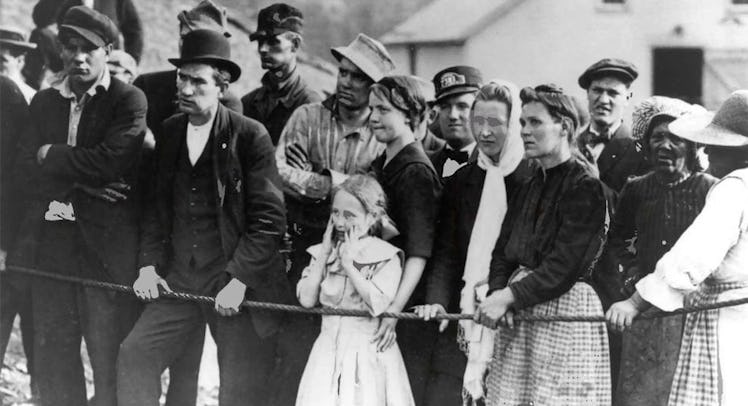The Forgotten Tragedy Behind the Very First Father’s Day
The surprisingly solemn and moving origins of the holiday we think we know.

It can be a challenge to celebrate holidays in the era of #holidays — whatever natural emotional tempo there is for anticipating big days on the calendar, it’s all but impossible to get a jump on the marketing campaigns that precede them. The historic — and personal — reasons for commemorating a certain day get crowded out by ads and retail pressures before we even have a chance to reflect on what it is we’re commemorating.
Father’s Day may come down the pike loaded with gift guides and dad-joke-emblazoned greeting cards, but its origins are surprisingly solemn. By the time President Lyndon Johnson made Fathers’ Day official, in 1966, with Proclamation 3730, it was a “well-established tradition.” And by the time Richard Nixon made Johnson’s proclamation permanent, in 1972, advertisers had already worn deep grooves around the holiday. But the decades-long campaign to create a national day celebrating dads is rooted in tragedy — and the tireless efforts of two women who wanted to honor the dedication and sacrifice of the fathers they knew.
On December 6, 1907, a massive explosion in the Fairmont Coal Company mines, in Monongah, West Virginia, killed an estimated 365 miners, most of whom were immigrants. The Monongah Mining Disaster is still widely considered the worst mining disaster in U.S. history; it devastated the surrounding community — it’s estimated that more than 1,000 children lost their fathers that day.
The idea of the town having a day to honor fathers began with Mrs. Grace Golden Clayton, who approached her minister at William’s Memorial Methodist Episcopal Church South with her plan. While Clayton had not lost her father during the mining explosion, she was deeply affected by his death in 1896, and she felt profound sympathy for the families who were mourning in the wake of the disaster.
“It was partly the explosion that set me to think how important and loved most fathers are. All those lonely children and the heart-broken wives and mothers, made orphans and widows in a matter of a few minutes. Oh, how sad and frightening to have no father, no husband, to turn to at such a sad time,” Clayton told a local newspaper at the time.
The Father’s Day service was held at Williams Memorial on July 5, 1908, as it was close to Clayton’s father’s birthday. But according to Reverend D.D. Meighen, “The day came and passed without much fanfare.” Meighen was a longtime pastor at Central United Methodist (which had replaced William’s Memorial) and also a bit of a Fairmont historian, having done extensive research into the community’s historic connection to Father’s Day. He says there are a variety of reasons the day didn’t gain much traction in Fairmont, including its closeness to the Fourth of July and the death of Lucy Billingsly, the daughter of a prominent family in town, the night before.
“As a result, Fairmont never adopted any resolutions to make Father’s Day a part of its town’s history,” Meighen explained.
Fairmont’s prominent role in the history of celebrating dads has been recognized by Hallmark and gets a shoutout in Maymie Kryth’s All About American Holidays, but it took the efforts of another woman across the country to set Father’s Day on a track toward federal recognition. Sonora Dodd organized a day celebrating dads on June 19, 1910, in Spokane, Washington, having been indirectly inspired by a Mother’s Day sermon in her local church. Dodd’s own mother had died in childbirth, and she and her five brothers had been raised by a single father, whose essential role in their lives she wanted to see honored. Dodd petitioned her city and state to issue Father’s Day proclamations, and the idea of an official holiday started catching on nationwide.
While Spokane is now widely associated with the first Father’s Day, Fairmont remains “the place where the first Father’s Day event was held,” Meighen says.
According to Meighen, the town itself mostly celebrates the day like any other town would. Some churches hold breakfasts and people give gifts and a few plaques at Central United Methodist and around town but beyond a “big commemoration” on the 100-year anniversary of the first service, Fairmont’s festivities are now in keeping with the general celebration, on June 19. In fact, it’s mainly Meighen who keeps the memory of Monongah mining disaster alive in Fairmont.
“I’ve personally had programs at the park and we will do that again this year to promote Father’s Day,” Meighen says. “I invite people in the community to come by and share stories about their father, sing songs, read poetry, or show any art they may have done to commemorate Father’s Day.”
But however we reckon its origins or we celebrate the dads in our own lives, the spirit of the day hasn’t really changed: It’s simply an opportunity to reflect on the important and special role that fathers play in their children’s lives, and to show love and gratitude to the dads we know.
This article was originally published on